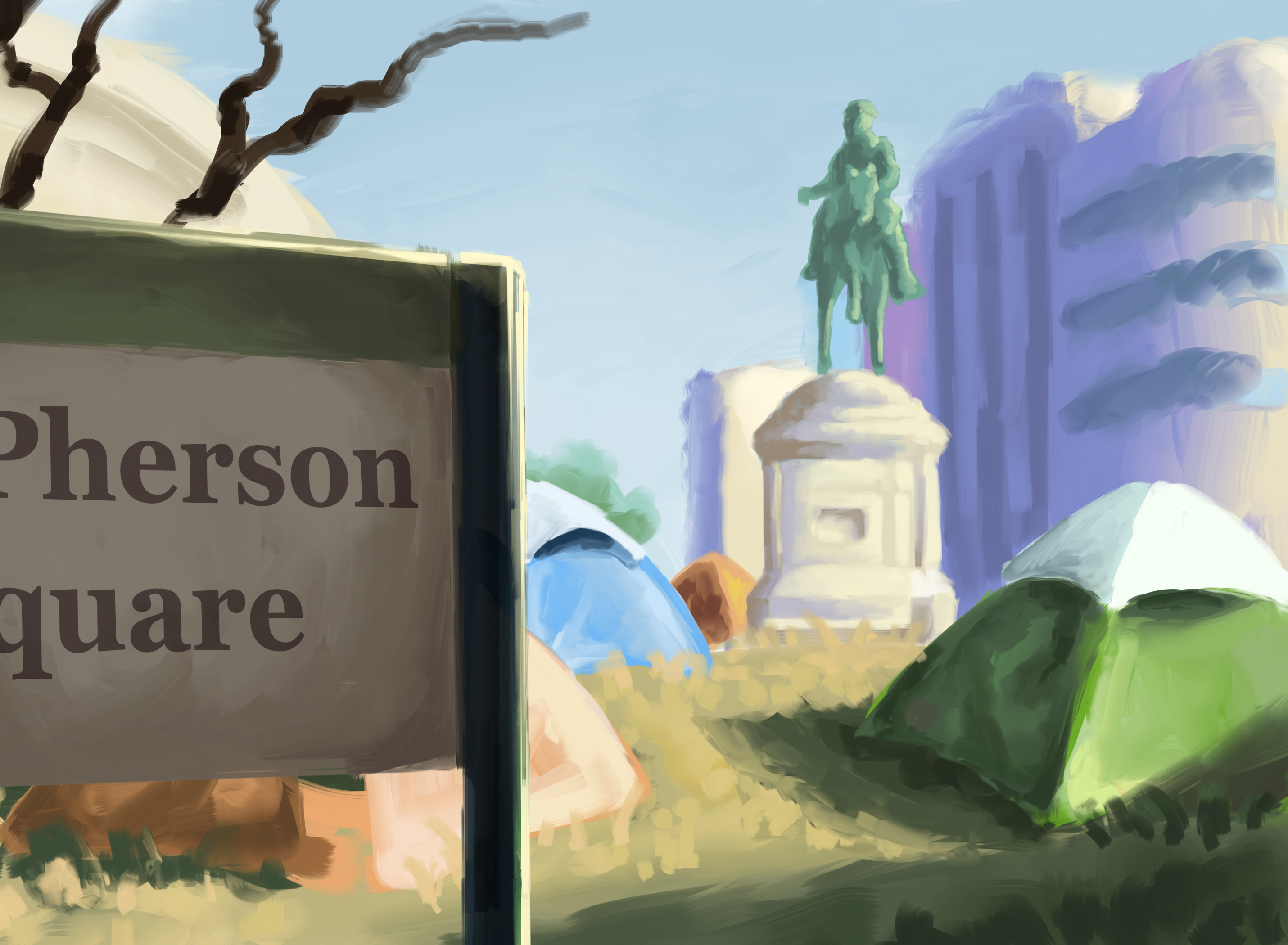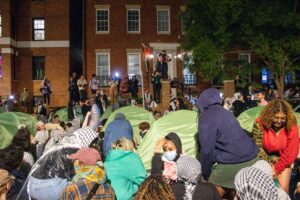On Feb. 15, D.C.’s Office of the Deputy Mayor for Health and Human Services (DMHHS) conducted an encampment “cleanup” at McPherson Square, where about 74 people experiencing homelessness resided in tents. Crews tore down tents and threw away belongings, and MPD arrested two residents who refused to leave. D.C.’s policy of encampment sweeps should be recognized for what they are: attempts to displace and criminalize those experiencing homelessness.
The media response to the clearing of McPherson Square—chiefly a Feb. 10 Washington Post editorial advocating for closure—perpetuates common myths around encampments and homelessness. Using DMHHS’s claim that the eviction was intended for “public safety,” the editorial’s flawed arguments discount the voices of McPherson’s residents and prioritize D.C.’s housed population. The cleanup is an example of D.C.’s continued harmful policies towards encampments, and the editorial’s approval makes the Post complicit.
As justification for their position, the Post cites five reasons they support the McPherson encampment cleanup: it’s in the best interest of the residents, now is as good a time as any, the square needs to be reclaimed as a park, it puts nearby neighborhood residents at risk, and the encampment holds symbolic significance in its proximity to the White House.
The encampment cleanup, however, did not increase safety, support, or connection to housing for most of its 74 residents. Following the cleanup, almost two-thirds of McPherson Square’s residents remain without housing, with only two matched through the permanent housing process.
Though DMHHS’s primary goal should be helping people transition into safe and permanent housing, case managers only spent two weeks in social services engagement with encampment residents—a process that usually takes months. The cleanup was initially scheduled for April, but DMHHS mayor Wayne Turnage advocated for McPherson’s closure to be moved up due to safety concerns. The accelerated timeline meant that not only were few matched with housing, but approximately 20 residents were never approached or did not accept support.
Even for those who could be reached by case managers, not all proposed solutions actually improve their standards of living. Some residents chose to live in McPherson Square due to factors like the risk of assault and COVID-19 transmission within traditional homeless shelters; for many, living in an encampment is preferable to alternative options. The Post notes three residents died over the past six months due to exposure or drug use, but closing McPherson—where residents can be reached by medical and housing representatives—creates a “whack-a-mole” system where residents are displaced to other encampments without permanent housing.
The Post waves away arguments against clearing the encampment with the assertion that there is “no optimal time […] to eradicate a tent encampment.” So, they argue, the city may as well do it now.
The Post’s line of thinking neglects the realities encampment residents face. Adverse weather conditions, like the sub-freezing February cold, create additional dangers for those experiencing homelessness. While the Post recognizes that some times are worse than others—the editorial calls the eased encampment enforcement during the pandemic a “smart and human decision”—the challenges faced by those experiencing homelessness have not disappeared since 2020. There remains a deficit of affordable units, long waitlists for permanent housing, a shortage of case managers, and higher COVID-19 transmission rates within shelters.
But the fact remains that McPherson didn’t need to be closed at all. The Post argues that McPherson needs to be reclaimed as a park, but America’s history of public urban parks speaks to design choices made to benefit wealthy, white visitors. The prioritization of a park over McPherson’s residents is not just a class issue, but a racial justice one—over 85 percent of D.C.’s population experiencing homelessness is Black. Expanded police presence often makes public parks hostile environments that exclude lower-income populations and people of color.
Even if the benefits of park space were shared equally, the lives of those experiencing homelessness remain far more important. Without serious, sustained work to ensure encampment residents find suitable permanent supportive housing, as well as policies to fight the economic insecurity and institutional barriers that cause homelessness, encampment sweeps only threaten lives. Justifying the clearing of McPherson Square based on park space is impossible when human lives are at stake.
In arguing that the presence of the encampment puts residents of the surrounding area at risk of harassment, the Post reinforces dangerous assumptions and prioritizes the security of predominantly white D.C. residents. Of course, the Post’s allegations about passersby of the McPherson Square encampment experiencing harassment are concerning—though the editorial cites no statistics to confirm the reports. But real safety comes from ensuring encampment residents receive the services and support they need, which doesn’t happen through encampment removal and arrests of residents. The narrative that the McPherson encampment is a hazard to public safety plays into perceptions of people experiencing homelessness as inherently dangerous, reinforcing racist stereotypes that further marginalization.
Finally, the Post’s point that clearing McPherson Square is symbolically important due to its proximity to the White House is no argument for removing it—and, in fact, could be seen as a better argument for allowing it to remain. The destruction of real lives in favor of manicuring a false appearance so close to the seat of national power carries with it, contrary to the Post’s assertion, a far more concerning symbolism.
The Post’s editorial is not just wrong—it’s harmful. The misuse of its platform to support dangerous policies represents a failure of compassionate journalism, which ought to be a primary responsibility of reporters. Mainstream news sources like the Post hold sway over public opinion and policymaking, and their publication of articles that deprioritize the voices and experiences of those experiencing homelessness has tangible impacts.
No, it was not time to clear out the McPherson Square encampment, nor would it ever be—particularly without any real framework to protect residents. D.C. should reconsider the ways it approaches encampments, and the Post should evaluate how its dialogue perpetuates flawed, racist, and cold-blooded arguments against the city’s most vulnerable.






Let’s send them to Georgetown’s campus! Win-win!